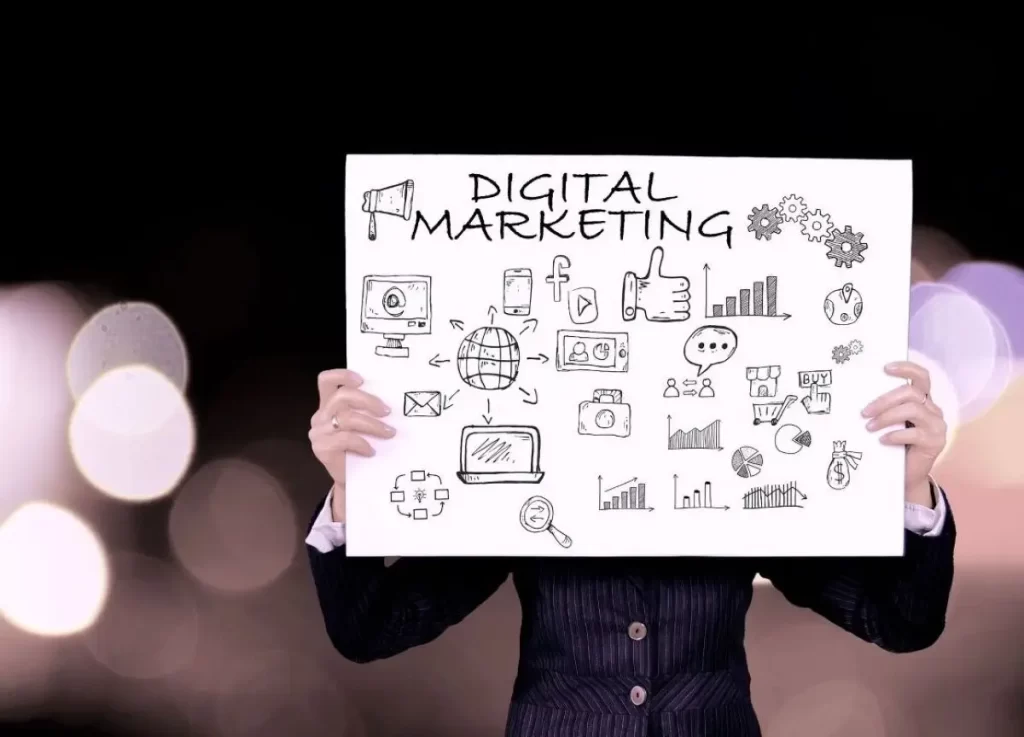Digital marketing is essential for small businesses because it helps them get their products and services out in the world. It also helps them to market themselves online and attract new customers.
Digital marketing is a way for small businesses to market their products and services in the digital world. It can be done through social media, email, blog posts, videos, or any other form of content on the internet.
Digital marketing allows small businesses to compete with big companies like Nike or Apple, which have more resources than they do.
Digital Marketing is a vital part of any business strategy. It helps in the acquisition and conversion of prospects into customers. A digital marketing strategy also helps to build a brand, increase visibility, and generate leads.
The first step is to make sure that your company has its website and social media accounts. This will allow you to get your message out there and reach more people.
key benefits of digital marketing include
- The ability to interact with your prospects and learn exactly what they are looking for, i.e. get to know your customers better!
- The ability to reach out to anyone and anywhere as there are no geographical boundaries with digital
- Target the right audience at the right time – personalization is simpler with digital marketing
- Communicate with your prospects at every stage of the buying process
- Save money and reach more customers for less
- Get to know your audience and drive engagement to create brand loyalty. Get some inspiration from the power of customer loyalty schemes.
- Track and monitor responses to your marketing efforts quickly and instantly.

How to Start a Successful Digital Marketing Campaign as a Small Business
Embarking on a successful digital marketing campaign is essential for small businesses aiming to establish a robust online presence. Let’s delve into the key strategies on how to start and navigate a successful digital marketing campaign tailored for small businesses.
Understanding Your Audience
Before diving into the campaign, it’s imperative to understand your target audience. Conduct thorough market research to identify your audience’s preferences, behavior, and online habits. This knowledge forms the foundation for crafting personalized and effective digital marketing strategies.
Defining Clear Goals and Objectives
Set specific, measurable, achievable, relevant, and time-bound (SMART) goals for your digital marketing campaign. Whether it’s increasing brand awareness, driving website traffic, or boosting sales, having clear objectives provides a roadmap for your efforts.
Building a Mobile-Friendly Website
In the digital landscape, a user-friendly and mobile-responsive website is non-negotiable. Ensure your website is optimized for various devices, providing a seamless experience for users accessing it from smartphones, tablets, or computers.
Search Engine Optimization (SEO)
Implementing solid SEO practices enhances your online visibility. Conduct keyword research relevant to your business and incorporate these keywords naturally into your website content. This helps search engines understand your offerings and rank your website higher in search results.
Social Media Marketing
Utilize the power of social media platforms to connect with your audience. Choose platforms that align with your target demographic, and consistently share valuable content. Engage with your audience through comments, messages, and social media advertising to amplify your reach.
Email Marketing
Building and nurturing an email list is a cost-effective way to stay connected with your audience. Craft compelling and relevant email campaigns, offering promotions, updates, or exclusive content. Email marketing fosters customer loyalty and drives repeat business.
Pay-Per-Click (PPC) Advertising
Consider leveraging PPC advertising, especially on platforms like Google Ads and social media. Allocate a budget for targeted ads that appear when users search for keywords related to your business. This targeted approach ensures your ads reach potential customers.
Analyzing and Adapting
Regularly analyze the performance of your digital marketing efforts through tools like Google Analytics. Monitor metrics such as website traffic, conversion rates, and social media engagement. Use these insights to adapt your strategies, focusing on what works best for your business.
Leveraging Local SEO
For small businesses catering to local markets, optimizing for local SEO is paramount. Ensure your business information is accurate and consistent across online directories. Encourage customer reviews, as positive reviews can significantly impact local search rankings.
How to Optimize Your Website & Content For Search Engine Optimization
Search engine optimization
Search engine optimization is a process in which you make sure that your website appears on search engine results for the keywords that your target audience finds your business. Digisocialmark is one of the top digital marketing agencies in Hyderabad.
The first step in optimizing your website for search engines is to choose the most relevant keywords to optimize. This can be done by using Google’s Keyword Planner tool, which provides valuable information about how many people are searching and what they are searching.
The next step is to use these keywords throughout the content of your website, including headlines, meta descriptions, and body copy. You should also include them in file names, image alt tags, and meta tags.
Incorporating keywords into links is another important factor in SEO. This can be done by using keywords. We are one of the best SEO agencies in Hyderabad.
FAQ`s
Digital marketing is crucial for small businesses as it levels the playing field, allowing them to compete with larger counterparts in the online space.
- Provides cost-effective advertising options for small budgets.
- Increases brand visibility and reach through online channels.
- Facilitates targeted marketing, ensuring messages reach the right audience.
Digital marketing plays a pivotal role in building and enhancing brand awareness for small businesses.
- Social media platforms amplify brand visibility among a wide audience.
- Content marketing establishes the brand as an authority in its niche.
- Online advertising campaigns generate targeted exposure and recognition.
Digital marketing fosters meaningful customer engagement, a key factor in the success of small businesses.
- Social media interactions create a direct connection with the audience.
- Email marketing campaigns encourage customer participation.
- Responsive websites and mobile optimization enhance user experience.
Digital marketing strategies are designed to precisely target and reach specific audience segments, ensuring maximum impact.
- Data analytics enable the identification of target demographics.
- Targeted advertising on platforms like Google and Facebook reaches specific user groups.
- Tailored content addresses the needs and preferences of the target audience.
Small businesses can measure tangible benefits from digital marketing efforts, contributing to overall growth and success.
- Trackable metrics, such as website traffic and conversion rates, provide insights.
- Return on Investment (ROI) can be measured for various digital marketing campaigns.
- Digital marketing allows for real-time adjustments to optimize performance.




